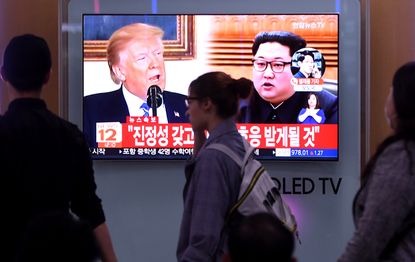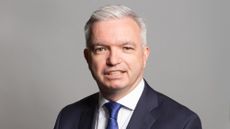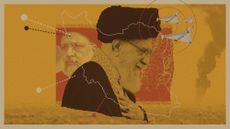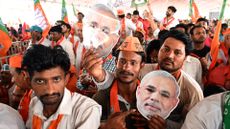The North Korea summit is shaping up to be one of Trump's biggest disasters
It's already going down the tubes


Not too long ago, the Trump administration was obsessed with showing North Korea how tough we are. "The U.S. has been talking to North Korea, and paying them extortion money, for 25 years. Talking is not the answer!" tweeted the president. Vice President Pence went to the DMZ so he could stare grimly across at the North ("I thought it was important that people on the other side of the DMZ see our resolve in my face," he said). But now we're headed for a summit between President Trump and Kim Jong Un, one that the president has become unusually invested in.
How invested? The White House has already produced a commemorative coin honoring the occasion. It's hard to avoid the suspicion that when this whole thing disintegrates and stands as one of Trump's great failures, that coin is going to be one heck of a collector's item.
Perhaps I'm being too pessimistic. But reports from inside the White House suggest that the president and some of those around him have indulged in the naïve belief that North Korea is eager to give up its nuclear weapons, for the mere price of an end to sanctions and some economic assistance.
Subscribe to The Week
Escape your echo chamber. Get the facts behind the news, plus analysis from multiple perspectives.

Sign up for The Week's Free Newsletters
From our morning news briefing to a weekly Good News Newsletter, get the best of The Week delivered directly to your inbox.
From our morning news briefing to a weekly Good News Newsletter, get the best of The Week delivered directly to your inbox.
People who actually know something about North Korea understand that Kim sees his nuclear weapons as the one ironclad guarantee of his power, and while it's theoretically possible that he might give them up, he's going to have to get an extraordinary amount in return. This is the most fundamental fact underlying these negotiations, yet it's one President Trump doesn't seem to grasp.
Trump was apparently alarmed, after all the recent happy talk, when the North Koreans reacted angrily to National Security Adviser John Bolton's suggestion that we might follow the "Libya model," in which Moammar Gadhafi gave up his nuclear program in exchange for economic assistance. Because Bolton is a shrewd operator, he knew exactly how provocative that was, since North Korea regularly brings up Gadhafi's experience as a reason why they won't give up their weapons; after Gadhafi gave up his program, within a few years he was deposed and killed.
Trump, however, only made things worse when he tried to explain. "The Libyan model was a much different model. We decimated that country," he said, going on to issue another threat: "That model would take place if we don't make a deal, most likely. But if we make a deal, I think Kim Jong Un is going to be very happy."
That's not exactly going to boost Kim's sense of security, before we even get to the negotiation. And who knows what the actual discussion could bring. According to The New York Times, Trump isn't prepared and doesn't want to be:
The aides are also concerned about what kind of grasp Mr. Trump has on the details of the North Korea program, and what he must insist upon as the key components of denuclearization. Mr. Moon and his aides reported that Mr. Kim seemed highly conversant with all elements of the program when the two men met, and Secretary of State Mike Pompeo has made similar comments about Mr. Kim, based on his two meetings with him in Pyongyang, the North's capital.But aides who have recently left the administration say Mr. Trump has resisted the kind of detailed briefings about enrichment capabilities, plutonium reprocessing, nuclear weapons production, and missile programs that Mr. Obama and President George W. Bush regularly sat through. [The New York Times]
Trump's resistance to learning is nothing new, but it does raise the possibility that he'll be ill-equipped to actually negotiate anything. He might give away more than he realizes, or miss opportunities to get something meaningful, simply because he won't know what the whole thing is about. And the whole thing could come crashing down.
Some of the fault for Trump's outsized expectations may lie with South Korean President Moon Jae-in, who has not only assured Trump of the North Koreans' readiness to make a deal, but has also showered him with compliments, including suggesting that he should win the Nobel Peace Prize. This obviously had a profound impact on Trump; he later said "everyone thinks" he deserves a Nobel, and the crowd at one of his rallies chanted "Nobel, Nobel!" to his evident delight.
But outside the White House, people saw this flattery for what it was: an attempt by Moon to ingratiate himself with Trump and get the American president to do what he wants. As Robert Kelly, a political scientist at a South Korean university, said over Twitter, "It is an open secret in Korea that this was just flattering Trump to prevent him from starting a war. No one actually believes it. My students and colleagues laugh at the suggestion. No one thought the Western media would actually start seriously debating it. Trump is loathed here."
That doesn't mean that some kind of an agreement is impossible, however. Trump is desperate for something he can call a "win" and proclaim the Best Deal Ever, and he probably doesn't care what it is. The North Koreans understand that the more Trump is invested in getting to an agreement, the more power they have, particularly since the status quo, while perhaps not being all that pleasant, is something they've been living with for some time.
So if Trump thinks he's going to be able to get North Korea to give up its nuclear weapons just because he's such a great deal-maker, he's probably got another thing coming. And then what are they going to do with all those coins?
Create an account with the same email registered to your subscription to unlock access.
Sign up for Today's Best Articles in your inbox
A free daily email with the biggest news stories of the day – and the best features from TheWeek.com
Paul Waldman is a senior writer with The American Prospect magazine and a blogger for The Washington Post. His writing has appeared in dozens of newspapers, magazines, and web sites, and he is the author or co-author of four books on media and politics.
-
 Mark Menzies: Tories investigate MP after 'bad people' cash claims
Mark Menzies: Tories investigate MP after 'bad people' cash claimsSpeed Read Fylde MP will sit as an independent while party looks into allegations he misused campaign funds on medical expenses and blackmail pay-out
By Arion McNicoll, The Week UK Published
-
 'Another day of chaos in DC'
'Another day of chaos in DC'Today's Newspapers A roundup of the headlines from the US front pages
By The Week Staff Published
-
 6 scenic white water rafting destinations to get your heart racing
6 scenic white water rafting destinations to get your heart racingThe Week Recommends Have a rip-roaring time on the water
By Catherine Garcia, The Week US Published
-
 Sudan on brink of collapse after a year of war
Sudan on brink of collapse after a year of warSpeed Read 18 million people face famine as the country continues its bloody downward spiral
By Peter Weber, The Week US Published
-
 How powerful is Iran?
How powerful is Iran?Today's big question Islamic republic is facing domestic dissent and 'economic peril' but has a vast military, dangerous allies and a nuclear threat
By Harriet Marsden, The Week UK Published
-
 US, Israel brace for Iran retaliatory strikes
US, Israel brace for Iran retaliatory strikesSpeed Read An Iranian attack on Israel is believed to be imminent
By Peter Weber, The Week US Published
-
 How green onions could swing South Korea's election
How green onions could swing South Korea's electionThe Explainer Country's president has fallen foul of the oldest trick in the campaign book, not knowing the price of groceries
By Sorcha Bradley, The Week UK Published
-
 Ukraine's battle to save Kharkiv from Putin's drones
Ukraine's battle to save Kharkiv from Putin's dronesThe Explainer Country's second-largest city has been under almost daily attacks since February amid claims Russia wants to make it uninhabitable
By Sorcha Bradley, The Week UK Published
-
 India elections 2024: the logistics of world's biggest vote
India elections 2024: the logistics of world's biggest voteThe Explainer More than 10% of the world's population is registered for a historic democratic exercise, with PM Modi likely to dominate again
By Harriet Marsden, The Week UK Published
-
 Erdogan set back in key regional elections
Erdogan set back in key regional electionsSpeed Read The main opposition party flipped or held Turkey's biggest cities, including Istanbul
By Peter Weber, The Week US Published
-
 Will Aukus pact survive a second Trump presidency?
Will Aukus pact survive a second Trump presidency?Today's Big Question US, UK and Australia seek to expand 'game-changer' defence partnership ahead of Republican's possible return to White House
By Sorcha Bradley, The Week UK Published